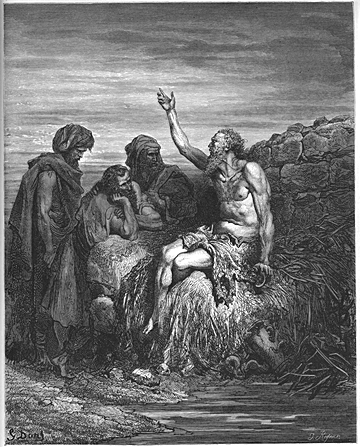Job 2
1 Ụbọchị ọzọkwa, ụmụ Chineke bịakwara igosi onwe ha nʼihu Onyenwe anyị. Ekwensu sonyekwaara ha ọzọ bịakwa igosi onwe ya nʼihu ya.
On another day, the angels came again and gathered together in front of Yahweh, and Satan came too.
2 Mgbe ahụ, Onyenwe anyị jụkwara ekwensu ajụjụ sị, “Ebee ka i si abịa?” Ekwensu zara onyenwe anyị, “Site nʼịwagharị nʼụwa na site nʼịgagharị ihu na azụ nʼime ya.”
Yahweh asked Satan, “Where have you come from?” Satan replied, “I have come from the earth, where I have been traveling back and forth, seeing what is happening.”
3 Mgbe ahụ, Onyenwe anyị sịrị ekwensu, “I leziela ohu m nwoke Job anya? Ọ dịghị onye ọzọ dị nʼụwa nke dịka ya. Ọ bụ nwoke zuruoke, onye na-emekwa ihe ziri ezi. Ọ bụ onye na-atụ egwu Chineke, na-adịghị etinye aka ya nʼihe ọjọọ ọbụla. Ọ ka jidekwara izuoke ya, nʼagbanyeghị na ị kpaliri m imegide ya ka m laa ya nʼiyi mgbe ọ na-adịghị ihe o mere.”
Yahweh asked Satan, “Have you (noticed/thought about) my [faithful] servant Job? He is very godly/righteous [DOU], he greatly respects/reveres me, and he [always] avoids doing evil things. And he still acts in a very godly/righteous manner, even though you persuaded me to [let you] cause disastrous things to happen to him for no reason.”
4 Ekwensu zaghachiri Onyenwe anyị, “Akpụkpọ anụ ahụ lara akpụkpọ anụ ahụ; mmadụ ga-enye ihe niile o nwere nʼọnọdụ ndụ ya.
Satan replied to Yahweh, “He praises you only because you bless him [IDM]. People will give up everything they have to save their own lives.
5 Setịpụ aka gị metụ akpụkpọ anụ ahụ ya na ọkpụkpụ ya, ọ ghakwaghị ị bụ gị ọnụ nʼihu gị.”
But if you harm his body [MTY], he will surely curse you openly [IDM]!”
6 Onyenwe anyị sịrị ekwensu, “Lee, ọ nọ nʼaka gị. Kama ị ghaghị idebe ndụ ya.”
Yahweh replied to Satan, “(All right/Okay), you may do to him whatever you want to do, but do not cause him to die.”
7 Mgbe ahụ, ekwensu sitere nʼihu Onyenwe anyị pụọ. O were ọnya ọjọọ na-egbu mgbu tie Job, site nʼọbọ ụkwụ ya ruo nʼopi isi ya.
So Satan left, and he caused Job to be afflicted with very painful boils, from the top of his head to the soles of his feet.
8 Job tụtụụrụ mpekele ite wara awa, jiri ya na-akọ onwe ya ọkọ nʼahụ, ma dinara nʼebe e kpokọtara ntụ.
Job took a piece of broken pottery and scraped the boils on his skin, and he sat in ashes [as people did when they were mourning for those who had died].
9 Nwunye ya sịrị ya, “Ị ka na-eguzo nʼizuoke gị? Bụọ Chineke ọnụ, nwụọ.”
His wife said to him, “Are you still trying to (be loyal to/faithfully trust in) God? You should curse God, and then you will die.”
10 Ma ọ zara, “Ị na-ekwu okwu dịka otu nʼime ndị inyom nzuzu. Anyị ga-anata ihe ọma site nʼaka Chineke, hapụ ịnata ihe ọjọọ?” Ma nʼime nsogbu a niile, Job emehieghị site nʼikwu okwu ọjọọ ọbụla.
But Job replied, “You talk like people who do not know God talk. (Should we accept only the good things that God [does for us]?/We should not accept only the good things that God [does for us].) [RHQ] We should also accept bad things.” So in spite of all these [things that happened to] Job, [he] did not say anything against God.
11 Mgbe ndị enyi Job atọ, Elifaz onye Teman, Bildad onye Shua na Zofa onye Neama, nụrụ banyere nsogbu niile dakwasịrị ya, ha biliri ije site nʼụlọ ha, ha zukọtara site na nkwekọrịta ịga nọnyere ya na ịkasị ya obi.
Among Job’s friends were Eliphaz from Teman [town], Bildad from Shuah [land] and Zophar from Naamah [land]. When they heard about all the terrible things that had happened to Job, they left their home areas and went together to Job to console/comfort him [DOU].
12 Mgbe ha hụrụ ya site nʼebe dị anya, ha amataghị ya, ha weliri olu bido iti mkpu akwa, dọkaa uwe ha yi nʼahụ ha, kporo aja kpokwasị onwe ha nʼisi.
When they saw Job from a distance, they almost did not recognize him. They wailed loudly, they tore their robes, and they threw dust over their heads [to show how sorry they were because of what had happened to Job].
13 Ha sooro Job nọdụ nʼala ụbọchị asaa, ehihie na abalị. Ọ dịghị onye gwara ya okwu nʼihi na ha hụrụ otu ihe mgbu ya si dị ukwuu.
Then they sat on the ground with Job for seven days. None of them said anything to Job, because they saw that he was suffering greatly, [and they did not think that anything that they said would lessen his pain].





















